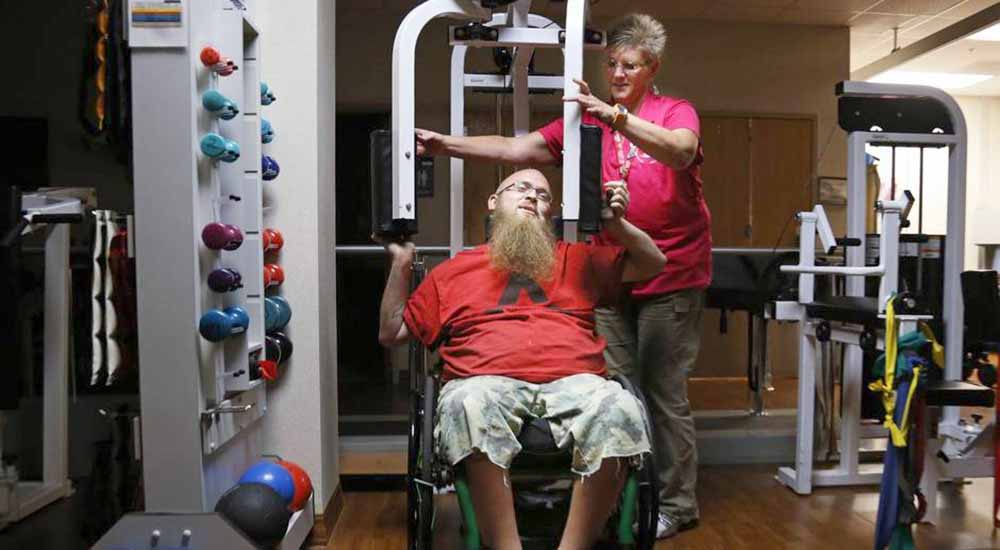Vietnam Veteran Ralph Heintz, 74, was transferred to a VA hospital from a community care hospital where he had been diagnosed with COVID-19. He was having a difficult time battling the virus.
The committed work of the VA Hines’ Physical Medicine and Rehabilitation Services Kinesiotherapy Team enabled him to be discharged in early August after months of specialized rehabilitation and care.

Joe Neczek, registered Kinesiotherapist, helps Veteran William Rice, 80, on the post-COVID unit at Hines VA Hospital.
Kinesiotherapy (KT) is a rehab profession that provides therapeutic exercise and holistic interventions to improve well-being and functional abilities. It has helped Veterans since World War II.
VA is the single largest employer of Kinesiotherapists (KTs) and treated more than 100,000 Veterans in 2019. The Edward Hines, Jr., VA Hospital was one of the first VA facilities to open a post-COVID unit.
During the recent challenges from COVID, Kinesiotherapists quickly shifted necessary outpatient evaluations and treatments to virtual care. This ensured Veterans’ safety while providing specialized rehabilitation for inpatient Veterans requiring extended physical reconditioning.
Coffee and cupcake to go
The use of KT was especially helpful to Heintz. He spent more than three difficult months battling the debilitating virus, receiving care from the Hines’ KT and Physical Therapy teams to help him recover.
“I am so grateful to Joe Neczek and Kelly Masterson for my therapy,” Heintz said. “They were the first people to get me out of bed, and they did not give up on me. I am getting therapy now at home, and they are very happy with my progress. So am I.”
Kelly Masterson is a registered KT who was providing rehab for Heintz at the time of his discharge. She said Heintz would frequently ask for “a cupcake and drink a cup of coffee.” He was on a feeding tube for a great majority of his hospitalization.
On his last day, Kelly got clearance to bring him a homemade cupcake and a cup of coffee. She brought it out to him when he was getting into his car for the ride home. His eyes lit up and his family said that it was a very touching moment.
Here’s another example of KT care

KTs Kelly Masterson (front), Suzanne Creedon and Joe Neczek (back), are ready to support Veterans’ rehabilitation needs.
In the photo above, Tammy Beeler helps Veteran Emmett Pryor train for the National Veterans Wheelchair Games. Beeler is a registered KT and certified Aquatic and Adaptive Sports Specialist at the North Texas VA Healthcare Center Spinal Cord Injury Center, in Dallas, Texas. (Photo taken in 2019.)
KTs across the VA health care system today are educated and specialty-trained at the undergraduate and graduate levels to support the complex needs of the Veteran population by focusing on skilled rehabilitation, improved function and quality of life.
VA’s unique holistic approach to KT involves the Veteran, as well as their family and caregivers. It emphasizes both the psychological and physical benefits of therapeutic exercise within acute, post-acute, outpatient and home-based rehabilitation services.
KTs also provide health and wellness coaching, disease prevention and comprehensive whole health practices.
For more information on VHA KT, please visit www.rehab.va.gov/KT/ and inquire about KT services within your local VA facility Physical Medicine and Rehabilitation Service.
Diane J. Waller, MHA, RKT is a rehabilitation planning specialist and coordinator for the National Physical Medicine and Rehabilitation Program Office within Rehabilitation and Prosthetic Services in VA Central Office. She has worked for VA for almost 26 years. She began her VA career as a registered kinesiotherapist and certified aquatic therapist at VA North Texas Health Care Center in Dallas.
Kathy Camp, MA, is the executive director of the American Kinesiotherapy Association (AKTA). Camp has over 20 years of communications, public relations, special event and political marketing experience.
Topics in this story
More Stories
The Medical Foster Home program offers Veterans an alternative to nursing homes.
Watch the Under Secretary for Health and a panel of experts discuss VA Health Connect tele-emergency care.
The 2024 National Veteran Suicide Prevention Annual Report provides the foundation for VA’s suicide prevention programs and initiatives.







So, why doesn’t the VA also provide The Feldenkrais Method to veterans? The Feldenkrais Method is a method whereby the body/brain is taught to find and use alternative motor functions that allow the patient to move, walk or bend or whatever, using different muscles than the body normally uses.I’m sure I’m over-simplifying it but it is a type of physical therapy. One which I feel could be beneficial to veterans.